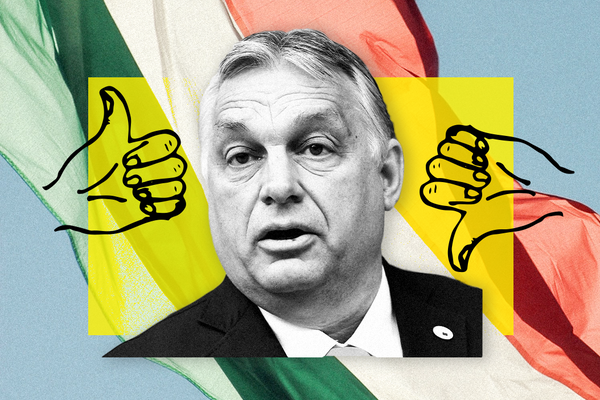News
October 18, 2021
Can this guy defeat Viktor Orban? Hungary's opposition movement of odd bedfellows has finally settled on the person they think has the best chance of defeating PM Viktor Orbán at the ballot box: Péter Márki-Zay, a politically conservative small-town mayor from southeastern Hungary, who beat out left-leaning European Parliament member Klara Dobrev in a weekend poll. Márki-Zay has a lot going for him: as a devout Catholic and father of seven it will be hard for the ultraconservative Orbán to paint him as a progressive threat, even as Márki-Zay reaches out to reassure left-leaning groups that he will protect LGBTQ rights. What's more, Márki-Zay has little political baggage: until recently he was a marketing executive. But can the relatively inexperienced Márki-Zay keep the various opposition factions happy? The stakes couldn't be higher: since taking power more than a decade ago, Orbán has deliberately made Hungary into an "illiberal" state, cracking down on the press, undermining the rule of law, and clashing with the EU. Bonus: if Márki-Zay stays in the news, you get to say "Hódmezővásárhely" the name of the city he currently runs.
Pakistani Taliban making a move? Emboldened by the triumph of their coreligionists in Afghanistan, Pakistan's Taliban movement — known as Tehrik-e-Taliaban, or TTP — is becoming more active as well. Seven years ago,Pakistan's military crushed the TTP in the regions of Pakistan along the Afghanistan border where they operate. But local reports say that they are coming back now, extorting local businesses, seizing territory, and carrying out terrorist attacks that have killed hundreds of civilians and soldiers. Pakistan, of course, has long-standing ties to the Afghan Taliban, but it's not clear whether that will help them manage growing tensions with the Pakistani Taliban who, for now, want political recognition and control over tribal borderlands. Would it be a mistake for Islamabad to negotiate with the TTP? A poll from last week showed that 55 percent of Pakistanis would welcome a Taliban-style government throughout the country.
Can Biden rescue abducted Americans in Haiti? Crisis-wracked Haiti was rocked by another catastrophe Sunday, when gang members abducted 17 foreign missionary workers (16 Americans and one Canadian national), including five children. It is yet another sign of the deteriorating security situation in the country, where nearly complete lawlessness has reigned since President Jovenel Moïse was assassinated in July. Large swaths of the capital Port-au Prince are now dominated by increasingly powerful gangs, who rule by terror and often kidnap civilians for ransom. In recent days, even Prime Minister Ariel Henry himself was forced to flee an official commemoration ceremony in the capital when gangs drove his security detail from the site. The US says it is working closely with the Haitian government to rescue the kidnapped missionaries, but remained mum on details. The Biden administration says it doesn't pay ransoms to terrorist groups or gangs, but we're watching to see whether it caves to the bad guys' demands.
More For You
As expected, the Supreme Court struck down the bulk of Donald Trump's sweeping “Liberation Day” tariffs as illegal … and almost nothing changed.
Most Popular
What's Good Wednesdays
What’s Good Wednesdays™, February 25, 2026
Sponsored posts
Small businesses at a crossroads
Chris, an Army veteran, started his Walmart journey over 25 years ago as an hourly associate. Today, he manages a Distribution Center and serves as a mentor, helping others navigate their own paths to success. At Walmart, associates have the opportunity to take advantage of the pathways, perks, and pay that come with the job — with or without a college degree. In fact, more than 75% of Walmart management started as hourly associates. Learn more about how over 130,000 associates were promoted into roles of greater responsibility and higher pay in FY25.
Ukraine's President Volodymyr Zelenskiy, Finland's President Alexander Stubb, Estonia’s Prime Minister, President of the European Commission Ursula von der Leyen and other European leaders visit memorial to fallen Ukrainian defenders at the Independent Square on the fourth anniversary of Russia's full-scale invasion, in Kyiv, Ukraine February 24, 2026.
Ukrainian Presidential Press Service/Handout via REUTERS
Somewhere in the Donbas region, Ukrainian soldier Artem Bondarenko says he hasn’t slept through the night in months as he defends Eastern Ukraine.
- YouTube
In the latest episode of Vladimir Putin and Xi Jinping's hit wellness podcast This Authoritarian Life, we learn how positive communication patterns can break negative cycles in our relationships -- especially our relationships with Iran, Syria, Venezuela, and Cuba. #PUPPETREGIME
© 2025 GZERO Media. All Rights Reserved | A Eurasia Group media company.
